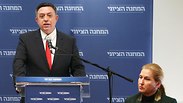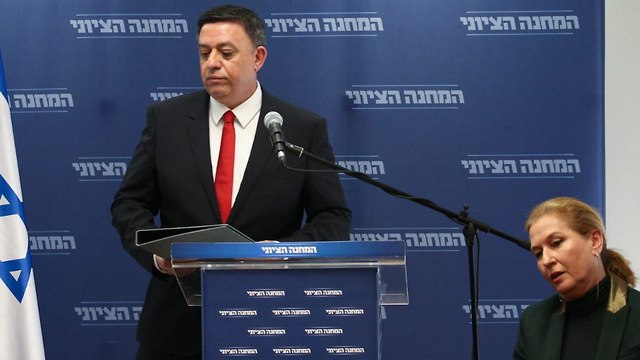
Labor Party head Avi Gabbay dropped a political bombshell on his Zionist Union co-leader Tzipi Livni on Tuesday morning, making an apparently unscheduled announcement that he is dissolving their partnership and splitting from her Hatnuah party.
The Zionist Union faction comprises Labor and Hatnuah, and was formed ahead of the 2015 elections by Livni and Gabbay's predecessor Isaac Herzog. When Gabbay replaced Herzog, Livni became leader of the opposition in parliament; Gabbay is not a member of the Knesset and therefore could not hold the position.
Gabbay made the shock announcement with Livni sitting beside him at a Zionist Union faction meeting.
"In light of political developments and the polls, I have been asked in recent days - do I really believe it is possible to win?" he said, as Livni sat beside him with an expressionless face
"Four and half years ago I decided to enter politics in order to affect change. I took this decision in the middle of Operation Protective Edge (the 2014 Gaza war), when I saw how the government of Israel was not waging war but rather running the government's public relations while Israeli citizens were under rocket fire and our soldiers were being killed in unarmored vehicles. I could have carried on making millions, but I decided it would be better for my children if I left behind a better country rather than acquiring another property for them to inherit. I chose the public," he said.
"Tzipi, I wish you every success in the elections, in any party you choose," he said. "We will continue to fight and be committed to the change that the people of Israel want. I entered politics for the people and always be on their side."
Gabbay said he had made every effort to keep the faction in place, but ultimately decided against it.
"It's not easy to enter into a partnership that someone else set up, but I reminded myself that I was committed to doing what was right to win elections, and I even tried to create total unification of the parties. Sadly, this did not happen. When Herzog resigned, Tzipi asked to become leader of the opposition in his place ... and said that this was her condition for continuing the partnership," he said. "I again chose the public, listened to the voices in our camp asking for unity and I accepted Tzipi's request. I chose to face the internal politics and preserve the unity of our camp."
Gabbay said it was obvious that the two parties were struggling to find common ground, and such tensions would harm their election prospects.
"I hoped and believed that the change and the new partnership will lead to our growth, to a real connection, to a mutual partnership," Gabbay said. "But the public is wise, and sees that this is not how things turned out. I still believe in partnership, in connections, in uniting a large camp and being committed to change, but successful connections require friendship, sticking to agreements and loyalty down the road."
Livni, who was apparently taken by surprise, said she would not respond immediately. She later tweeted her gratitude to her supporters and vowed to keep working on her political vision.
"Thank you for the calls, the messages and the support," she wrote on Twitter. "It is just as well that any doubts have been dispelled, and we can focus on the important national challenge ahead of us. To all those who truly believe in our path - there will be a revolution in the coming elections."
Labor MK Itzik Shmuli told Ynet in the immediate aftermath of the announcement that the aim of the split is to make room for a new partnership with former IDF chief Benny Gantz's nascent Israel Resilience party. The first poll held after the April 2019 elections were announced shows that Gantz would lead the second-largest party with 13 Knesset seats. The same poll showed that with Gantz in the mix, Zionist Union would win just nine seats - down from its current 24.

















